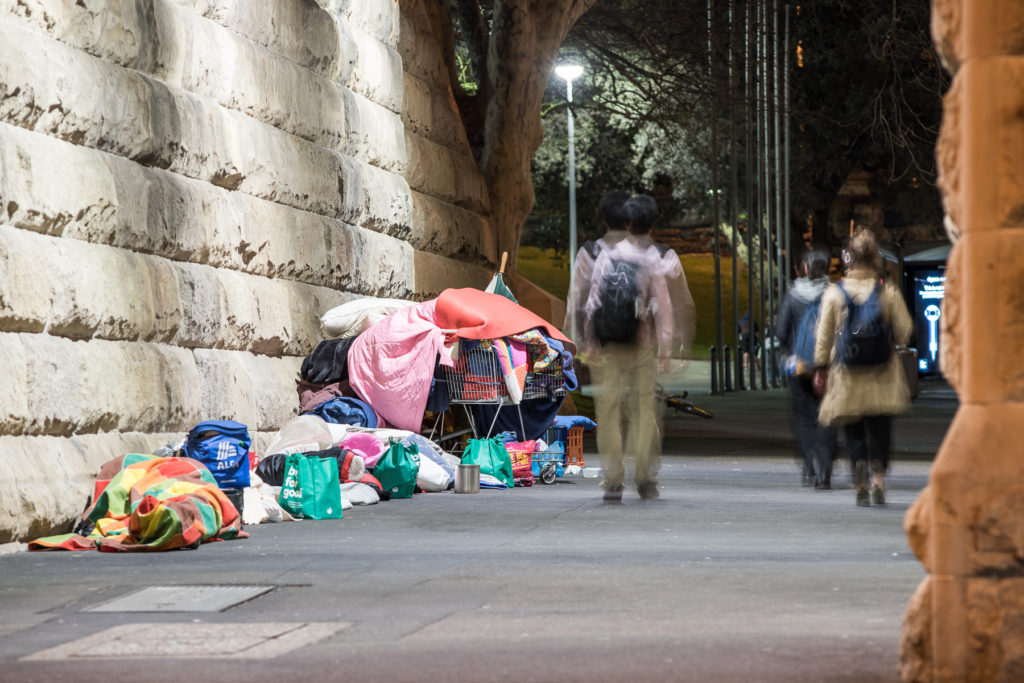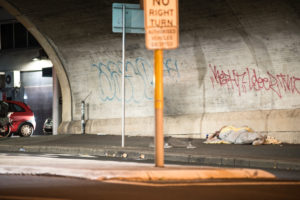
Ground-breaking Microsoft app helps NSW respond to COVID-19 today and can help end street sleeping in cities across the world in the future
At a time when most of Australia has been staying at home to reduce the spread of COVID-19, the plight of people sleeping on the streets is thrown into especially stark relief.
Keeping people safe during COVID-19 goes beyond providing a temporary roof over their heads. The NSW State Government and homelessness sector have been working quickly to reach out to people sleeping rough and offer immediate shelter. Now the team’s focus has turned toward assisting these most vulnerable people find more stable accommodation for the long term.
NSW Minister for Families, Communities and Disability Services Gareth Ward said the rapid expansion of homeless outreach and the NSW Government’s investment to increase the supply and flexibility of temporary accommodation presents an opportunity to help more rough sleepers break the cycle of homelessness.
“We have been able to help about 1,000 rough sleepers into accommodation across the state in recent weeks, as we work to prevent the spread of COVID-19. It is important that we now focus on providing those people with the services and support they need to transition out of temporary accommodation and into safe and stable housing.”
Aiding the organisation of these supports is the world’s first electronic data capture tool, designed in collaboration with Microsoft.
Microsoft’s data collection tool powers the By Name List and is a multi-platform app. Used for the first time in November 2019, it leverages the methodology recommended by the Institute of Global Homelessness. Data about people sleeping rough, their health housing and personal history is collected using the Microsoft By Name List app and made available to specialist homelessness services which match people with suitable, safe accommodation and care.
In its current form the By Name List holds information on rough sleepers in Sydney collected in November 2019. In the COVID-19 response the By Name List data has been provided to health and homelessness services.
According to Christine McBride, CEO of the End Street Sleeping Collaboration; “The By Name List is very new and COVID-19 has really underlined its potential. As part of the COVID-19 taskforce we are making plans to use the By Name List to help the team more effectively plan for people’s exit from temporary accommodation into permanent supported housing.”
Shane Jakupec from homelessness specialist, Neami National, one of the several organisations leading the push to transition people who have been sleeping rough into temporary and then permanent accommodation, said
Knowing a person’s story and understanding their needs helps us to make better recommendations when we’re working with people who have been street sleeping. That is important because it means that the person leaving the streets is more likely to maintain their tenancy and start repairing their lives. The End Street Sleeping Collaboration’s Microsoft By Name List is going to be critical to our COVID-19 response work.
The future of the By Name List
An upgraded version of the app is now being developed by Microsoft which will make the By Name List data available in real time – this will be the world’s first real time By Name List. Current best practice internationally is weekly or monthly updates. In the future the rapid turnaround and real time access to data will enable even better support for homeless people in NSW.
“End Street Sleeping Collaboration has taken the Institute of Global Homelessness methodology and worked with Microsoft to make it faster and more responsive.”, said Christine McBride. “Sydney is the only city, out of the thirteen that have signed up to become an Institute of Global Homelessness Vanguard City, to have developed an app.
As it evolves and is improved, the app will mean that front-line workers in homelessness services input information about people sleeping rough when they’re in the field. The data helps match people with the most appropriate homelessness support agencies and ensures that people don’t have to repeat their stories to different agencies and service providers. Put simply, it helps to join up the cracks in the system so nobody slips through. Real time data is always important but its value has never been clearer than during this COVID-19 emergency.”
Chairman of the Institute of Global Homelessness, Dame Louise Casey DBE CB said, when she visited Australia in March and saw the work on the new Microsoft app; “This work being done in NSW is ground-breaking. It is being piloted in Sydney; and there are plans to roll it out across NSW; but I see a role for the app and a real–time By Name List in cities across the world. The United Nations has a new focus on homelessness as part of the Sustainable Development Goals and recognises that data is essential to elimination of homelessness. I see a lot of potential for this good work that’s been initiated in Australia to be shared globally.”
The COVID-19 crisis has been such a tragic and testing time for many but it has also been a crisis that has sped up innovation. Victor Dominello, NSW Minister for Customer Service, remarked about the partnership;
“I commend Microsoft and the End Street Sleeping Collaboration for partnering with the NSW Government to better understand and address the causes of street sleeping. This project is a great example of using technology to make life easier for people needing support services.”
Background on the End Street Sleeping Collaboration and its By Name List of people sleeping on the streets
Every day across NSW, thousands of people experience homelessness; the most at risk are people sleeping on the streets. The End Street Sleeping Collaboration brings together Government, the sector’s leading NGOs and the Institute of Global Homelessness to work together and tackle the problem.
In 2019 the NSW Premier, Gladys Berejiklian, signed a joint commitment with the Institute of Global Homelessness which led to the formation of the ESSC and committed Government, and the largest NGOs in the homelessness sector to two initial goals: to reduce street sleeping across the whole of NSW by 50 per cent by 2025 and work toward zero by 2030.
In November 2019 the ESSC took a Microsoft Power Apps By Name List solution to the streets of Sydney for the first time to collect data from homeless people. The data collected helps match people with the most appropriate support agencies and ensures that they don’t have to repeat their stories to different agencies and service providers.
During November 2019’s Connections Week the data collected revealed that the average time people had been homeless was 5.6 years, their average age was 44. The data also showed that Aboriginal and Torres Strait Island people were over represented – with 15 per cent identifying as indigenous. Like all people sleeping on the streets this group is especially vulnerable to COVID-19; as are people with underlying health conditions such as asthma, emphysema, cancer and diabetes.
The foundation work that ESSC, in association with Microsoft, undertook last year has provided the government’s COVID-19 response efforts with critically important insights about how to support some of society’s most vulnerable people at this very difficult time.
We’re focused on supporting our customers during these difficult times. For more information on how we can help your business, please see our dedicated webpage and report on Supporting Resilient Operations. We’ll be updating these resources regularly as the situation evolves.















